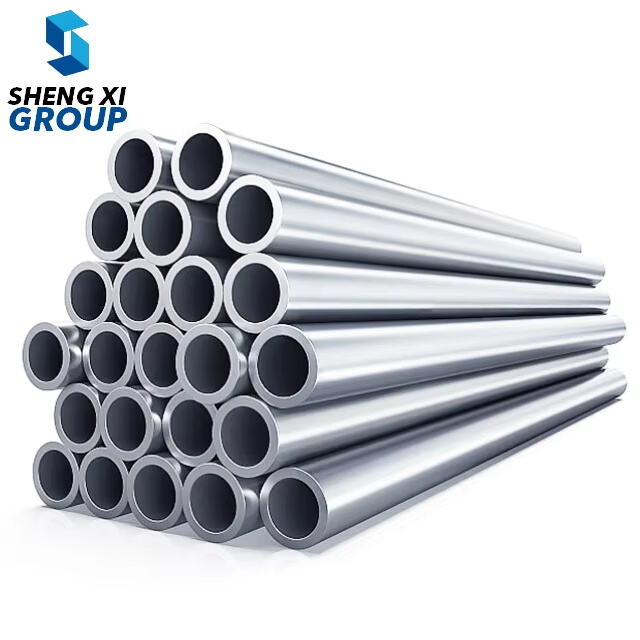Introduction: The Critical Role of Alloy Steel in Modern Industry
Alloy steel holds massive importance across today's industrial landscape. This type of steel stands out because of its improved qualities and has become fundamental in both manufacturing and engineering sectors. When manufacturers mix iron with elements such as nickel, chromium, and molybdenum, they create a material with special traits that work well in countless situations. From building towering skyscrapers to making cars on assembly lines, the extra strength, durability against wear, and protection from rust make alloy steel indispensable. Around the world, these specialized steels account for quite a large share of total steel output, showing just how critical they are for meeting constantly rising production needs in various fields.
Automotive Sector Applications of Alloy Steel
Engine Blocks and High-Strength Components
Engine blocks rely heavily on alloy steel because of how tough and strong it really is. When engines run hot and stressed out all day long, regular steel just doesn't cut it anymore. That's where alloy steel shines bright. The auto industry has been going nuts over lighter materials lately, so engineers keep coming up with new ways to tweak alloy steel formulas. What these changes do is let manufacturers build engine parts that weigh less without sacrificing any strength or longevity. Some research from car companies actually shows that when they switch to better alloy steels in their designs, fuel economy gets boosted around 15 percent. Pretty impressive stuff considering we're talking about something as fundamental as engine construction here. For anyone building cars today who cares about both performance and planet friendliness, alloy steel remains pretty much indispensable.
Transmission Gears and Drivetrain Systems
Alloy steel transmission gears stand up to the intense forces vehicles put them through every day. They need to handle all that torque and stress without breaking down. What makes alloy steel so good for this job? Simply put, it resists wearing out and can take repeated punishment without failing. That's why most drivetrain systems rely on alloy steel components. Mechanics know this stuff lasts longer between repairs. Studies from auto engineers back this up showing these parts cut down on repair bills and keep cars running smoother over time. For car makers and drivers, this means fewer trips to the shop and better performance overall. No wonder alloy steel remains a go to material across the automotive industry despite newer alternatives coming onto the market.
Structural Elements for Enhanced Vehicle Safety
Using alloy steel for structural parts represents a major step forward in car safety, making vehicles much better at resisting crashes and keeping passengers safer. When engineers design cars with alloy steel, they actually create structures that soak up more impact force when collisions happen, which means fewer injuries overall. The numbers back this up too – cars built with these stronger steel reinforcements have been shown to hold up against crashes about 30 percent better than older models made with regular steel. That's why we see so many manufacturers now putting alloy steel into their frames first thing. After all, nobody wants to compromise on safety, especially not when materials exist that make a real difference in accident scenarios.
Alloy Steel in Construction and Infrastructure Projects
Skyscraper Frameworks and Building Supports
The strength to weight ratio of alloy steel is what makes it so essential for building skyscrapers, allowing massive structures to stand tall without needing too much bulk. Beyond just holding things up, this metal actually fits well with today's architectural styles since it combines solid strength with sleek looks that architects love. What really stands out though is how tough it is against all sorts of weather conditions, which means buildings last longer before showing wear and tear. Industry data suggests that structures built with alloy steel tend to have around 20 percent fewer problems over time when compared to regular carbon steel constructions. That kind of track record explains why cities keep turning to alloy steel for their tallest buildings.
Durable Bridge Construction Solutions
Bridge builders prefer alloy steel because it stands up well to bending forces and handles tension really well, making it ideal for holding up heavy weights across long distances. When engineers build bridges with this type of steel, they tend to last much longer before needing repairs or replacements, which cuts down on maintenance expenses in the long run. Studies from civil engineering experts show something interesting: bridges made with alloy steel typically stay structurally sound about half again as long compared to ones built with conventional materials. Beyond just saving money, this means our infrastructure remains safer and more dependable through decades of use, especially important considering how critical many transportation links have become in modern society.
Underground Pipelines and Utility Networks
When building underground pipelines, one of the main reasons people choose alloy steel is because it resists corrosion so well. This matters a lot when moving things like oil, gas, and water through the ground. The steel's ability to stand up against rust keeps our utility systems intact and safe over time. Companies that install these pipes find they work better long term since there are fewer problems with leaks. Research shows alloy steel actually fails less often than plastic or regular carbon steel options out there. That makes sense why so many municipalities switch to alloy steel pipelines whenever possible for their water and gas lines.
Oil and Gas Industry Reliance on Alloy Steel
Drilling Equipment for Harsh Environments
Alloy steel is really important when making drilling equipment for tough environments. What makes this material stand out is its ability to handle both high heat and intense pressure, exactly what's needed downhole during oil and gas operations. Equipment built with alloy steel lasts longer simply because it doesn't break down as easily under these punishing conditions. Industry insiders know that tools constructed from alloy steel tend to outlast regular steel counterparts by a significant margin. This means fewer replacements over time and better performance when things get rough underground. The bottom line? Companies save money on maintenance while getting more reliable results from their drilling operations in some of the harshest places on earth.
Corrosion-Resistant Pipeline Systems
Corrosion resistance matters a lot in the oil and gas business, which is why many companies turn to alloy steel for their pipeline systems. When treated properly, these steels resist corrosion better than regular materials. Pipelines made from this special steel last longer before needing repairs or replacements. Plus, they keep whatever's moving inside those pipes safe from contamination or degradation over time. Studies show that switching to corrosion resistant alloys saves money too. Some estimates put annual savings at several million dollars when looking at all the avoided maintenance work and fewer emergency shutdowns needed. This kind of reliability makes operations run smoother and reduces risks across the entire oil and gas supply chain.
Valves and Fittings Handling Extreme Pressures
In the oil and gas business, alloy steel valves and fittings just cant be beat when dealing with those crazy pressure spikes and temperature swings. Built tough, these parts hold up under brutal conditions so they keep working right even when things get rough. What makes alloy steel stand out is how well it maintains its strength and reliability despite all the punishment it takes on job sites. Some numbers back this up too many companies report around a 25% drop in breakdowns after switching to quality alloy steel valves. That means safer operations overall and fewer headaches for maintenance crews trying to fix problems downhole or offshore where repairs are both time consuming and expensive. No wonder most major players stick with alloy steel for their most important systems where failure simply isnt an option.
Machinery and Tool Manufacturing with Alloy Steel
High-Strength Components for Heavy Machinery
When it comes to building heavy machinery, alloy steel just can't be beat for those high strength parts that need to hold up under pressure. What makes this material so special? Well, it stands up to all sorts of stress during operation without bending or breaking down, which is exactly what manufacturers need when putting together complex machine components. That's why most serious industrial operations rely on alloy steel for their critical parts. The numbers back this up too many plant managers report seeing far fewer equipment failures when alloy steel is used throughout the build process. And let's face it, less downtime means better productivity across the board. Plus, these machines last longer before needing replacement parts, cutting down on those expensive repair bills over time.
Wear-Resistant Cutting Tools and Dies
Because alloy steel is so hard and resistant to wearing down, manufacturers often pick it for making cutting tools and dies needed for precision work in factories. These tools just plain last longer, which means companies don't have to replace them as frequently, saving money over time. Some tests actually showed alloy steel cutting tools can stick around three times longer compared to regular carbon steel ones. The fact that they hold up better keeps production running smoothly without unexpected stoppages. Plus, when tools need replacing less often, the whole manufacturing process becomes more economical in the long run.
Industrial Equipment Requiring Thermal Stability
Many industries need materials that perform reliably no matter what temperature they face, and alloy steel stands out because it handles heat really well without losing its properties. Parts made from this type of steel don't expand much when heated, so they keep their shape and work properly even when temperatures go up and down throughout the day. Mechanical engineers have found through testing that these steel components last longer and work better in places where both heat levels and pressure constantly change. That's why factories, power plants, and manufacturing facilities all over the world rely on alloy steel for critical machinery parts that must function consistently despite harsh operating conditions.
FAQ: Alloy Steel
What is alloy steel composed of?
Alloy steel is composed by combining iron with other elements like nickel, chromium, and molybdenum to enhance its strength, hardness, and corrosion resistance.
Why is alloy steel important in the automotive sector?
Alloy steel is crucial in the automotive sector due to its durability and ability to enhance fuel efficiency by up to 15%. It also provides strength and reliability in transmission gears and structural elements.
How does alloy steel contribute to construction projects?
In construction, alloy steel is used for skyscraper frameworks and bridge construction due to its high strength-to-weight ratio, durability, and reduced maintenance needs.
What role does alloy steel play in the oil and gas industry?
Alloy steel is used in the oil and gas industry for drilling equipment, pipeline systems, and valves due to its resistance to harsh conditions and enhanced corrosion resistance.
Are there any advantages of using alloy steel in machinery manufacturing?
Yes, alloy steel offers advantages such as increased operational reliability, wear resistance for cutting tools and dies, and thermal stability in industrial equipment.


